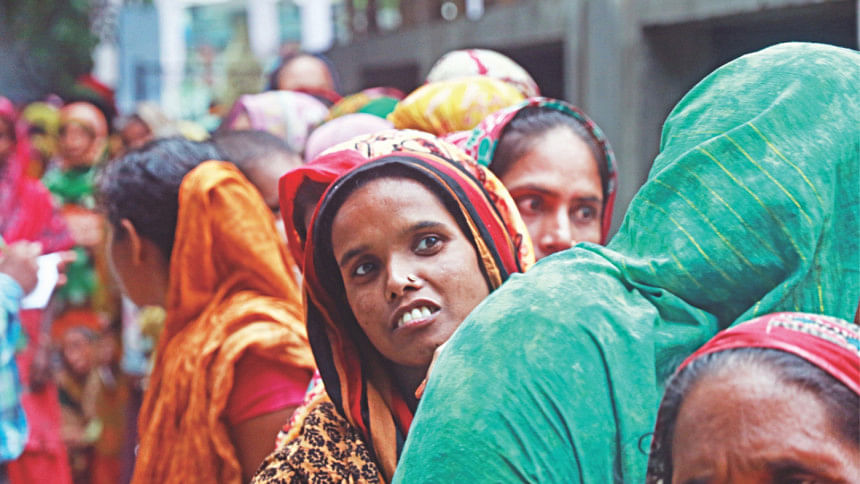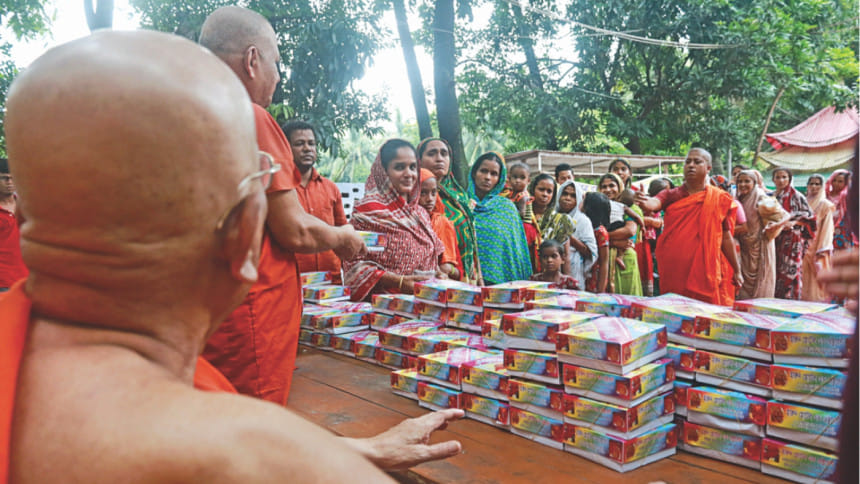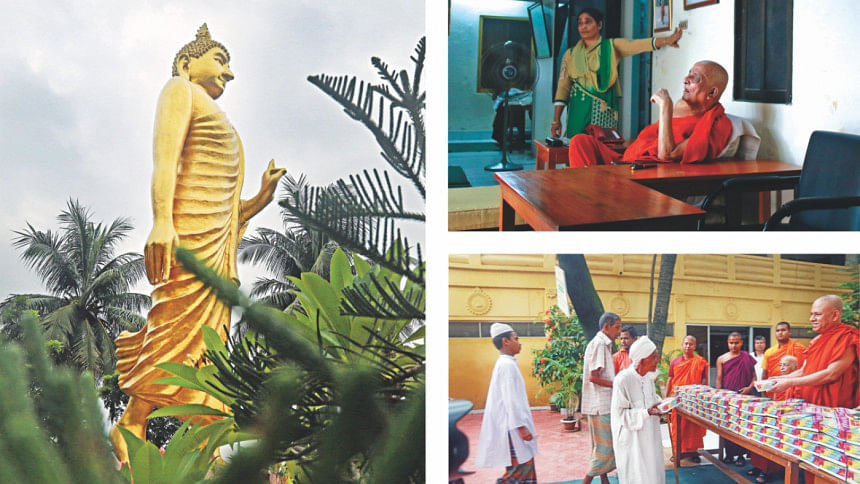IN THE NAME OF HARMONY

Photo: Kazi Tahsin Agaz Apurbo
"I have come from Baitul Mukarram. I read in the news that you were offering iftaar. Can I get a box?" asks a hopeful, smiling young man, as he entered Dharmarajika Buddhist Monastery. He asks this question directly to the man behind this enormous act of kindness, High Priest Shuddhananda Mahathero. Mahathero smiles and says, "Go and wait over there, my son," pointing at the vast plain field where the iftaar boxes are to be set up later, "we will be bringing out the food shortly."
Six years ago, Dharmarajika Buddhist Monastery began this project based purely on humanity, which some have termed to be "a rare example of social harmony between the religions in South Asia." The act was initiated by the High Priest of the temple, who believes that humanity is the ultimate scope of humans. "All I know is that we are all humans. I am human, you are human. It is our jobs to help each other in the time of need. What will enmity achieve? Nothing. What will dispute achieve? Nothing. It is humanity that is every person's ultimate scope. It is humanity that will bring peace," says Mahathero.

Mahathero is a firm believer in inter-religious harmony. "Why should there be such conflict? We are all Bangladeshis. This land is for all of us. With helping each other, we can make this country great. Without each other's help, there is only destruction waiting. These people I am feeding, I don't think I'm doing a big thing here. I'm carrying out my basic duties as a human being. These people are poor, they cannot afford food for themselves and their families, yet their faith is so strong- they are all fasting in this holy month. As a person of this nation, as a person of this area, it is my duty to help them if it is in my capabilities."
Dharmarajika Buddhist Monastery was established in the 1950s, in Kamlapur (but can also be located as Bashabo Boudhho Bihar), and they have been quite popular in Dhaka city for their social acts and welfare projects. Through their projects, they have successfully assisted community members during disasters and problems they may be facing.
To improve the lives of the youth and to aid those that have nowhere to go or nobody to go to, the Dharmarajika Buddhist Monastery opened an orphanage and school in 1972, including nursery, high school and college studies, and have fruitfully assisted thousands of children to realise their dreams of becoming important and helpful members of society-- by becoming engineers, teachers and doctors. They have around 700 students, all from different backgrounds, walks of life and religions. "Even those who have finished studies can still reside here if they choose to," says Karuna Bhikkhu, a member of the monastery, as we pass by a field where students of the hostel play a quick game of football, with ducks, dogs, and other animals roaming about with utmost freedom!
The Dharmarajika Buddhist Monastery also consists of a prayer dormitory, the main Shrine, the Nikko Niwano Clinic and the Dharmarajik Lalitakala Academy. There are also donations of statues and relics from different countries, the biggest being inaugurated by our Prime Minister Sheikh Hasina herself.
One of the most historical and religious aspects of the temple is the large tree that is near the prayer hall. "The root has been split and spread across to different Buddhist Monasteries because it was the tree that Siddhartha Gautama was enlightened under," says Karuna Bhikkhu. A visit to the Dharmarajika Buddhist Monastery is most definitely worth it, as it incorporates architectural wonder and historical artifacts, along with the humanity and kindness of the community.
It has been six years since the monastery has been offering iftaar to underprivileged Muslims of the area and beyond. The boxes contain the typical Bangladeshi iftaar, including favourites such as potato chops, peyaju (onion tempura), beguni (eggplant tempura), chhola-boot (lentils), khejur (dates), muri (puffed rice), and jilapi (a sweet made of sugar syrup). "Because we don't know the exact ways of making these delicacies, since these foods are not a part of our daily meals, we have hired those who know to prepare them exactly like how people like it. We have partnered with a hotel that sends cooks to our monastery and they cook for around 500 people," says Karuna Bhikkhu, "we make sure the cooking is done under our supervision so we can ensure hygiene and safety to those who have been fasting all day."

Those who have learned under the guidance of Shuddhananda Mahathero have the same values as he does. "We all learned throughout our lives to be kind to everyone, because we are all human beings- made of the same flesh. If most people were bad, we wouldn't have survived so long here, right? If all good people came together, with kindness and compassion, we can fight evil and learn to live in harmony," says Karuna Bhikkhu.
As the clock strike 5 in the afternoon, the table is set up with piles of boxes, close to the vast pond in the middle of the monastery. In front of the table, two lines formed within seconds, consisting of countless men, women and children. The line of women and children is at least twice as long as that of men. Each and every single person in the lines have an expectant smile on their faces, as they greet the members of the monastery with 'adaabs' and receive replies of 'salaams'.

"They are very kind people. Each and every one of them speaks to us with respect and compassion. I have been coming here for three years, and not once did I have anything to complain about. The food they give us is filling, and just the way they behave with us can complete our day. May Allah (SWT)bless them all," says an elderly woman, waiting in line. While another woman carrying her child chimes in, "It hardly matters what religion they are from. It is the way they treat us that speaks great volumes. This act of kindness will never go unnoticed or unappreciated, by any of us here."
Such an act of compassion and humanity, during this Holy month of Ramadan, is truly exemplary. It goes to show the effect such a beautiful, spiritual month has on our society, when compassion and acceptance itself, no matter who from, becomes the language we speak in.
To read more click Dharmarajika's Act of Compassion


 For all latest news, follow The Daily Star's Google News channel.
For all latest news, follow The Daily Star's Google News channel. 



Comments